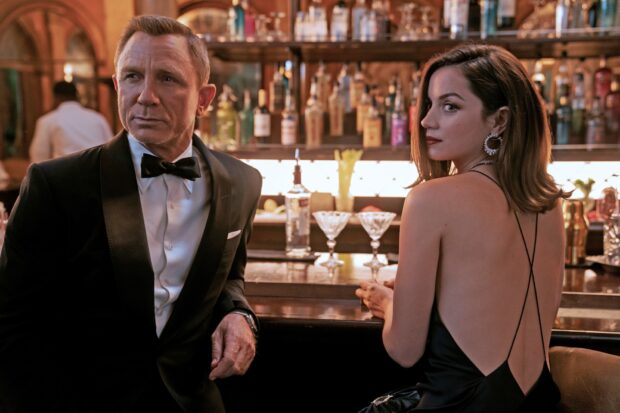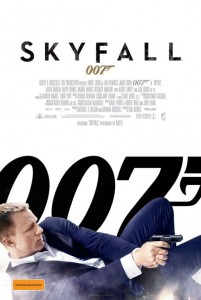In October 2005, Eon Productions announced the casting of Daniel Craig. As the sixth actor to take on the role of James Bond in their successful film series, the announcement was not immediately embraced. Anti-fan sites launched campaigns that foreshadowed more commonplace social media assaults a decade later. Yet after Casino Royale was released in 2006, the critics were (mostly) silenced. Now, after 15 years and five outings, Craig’s self-contained saga comes full circle in a satisfying conclusion.
Picking up sometime after Spectre, Bond and Madeleine Swann (Léa Seydoux) are hanging out in Southern Italy in extramarital bliss — until things go boom. Feeling betrayed, Bond leaves her on a train and disappears. Five years later, when an MI6 scientist is kidnapped, it’s unveiled that M (Ralph Fiennes) has been involved in the development of a programmable bioweapon with deadly accuracy. It gets into the hands of Safin (Rami Malek), a terrorist leader with ties to Madeleine’s past and his own agenda.
NO TIME TO DIE wastes very little of its time setting the scene before plunging us into the action. Opening with a gloriously shot prelude sequence that plays like a wintery horror western, the pre-title sequence involves an explosion, a bike chase and a bullet-riddled Aston Martin. It’s an acknowledgement of the things that make audiences turn up in droves, continually escalating through a kinetic Cuba sequence (with a wonderful cameo from Ana de Armas) to the inevitable secret lair showdown.
Yet more than anything, it’s about character. Not since George Lazenby’s short-lived stint in On Her Majesty’s Secret Service — a film that is referenced several times in this outing — has the notion of Bond been so thoroughly interrogated on screen. It’s there overtly, of course, in the presence of Nomi (Lashana Lynch) as the inheritor of the 007 mantle during Bond’s retirement. Yet in the film’s final act, where Safin characterises their dichotomy as “two heroes in a tragedy of their own making,” the film directly address who James Bond is when you strip away the armour.
The rest of the cast is impeccable, with only a handful of new friends joining a cast of familiars. Lynch is unquestionably the standout of the new faces, a capable equal for Bond and an indicator of where the series can go from here. Indeed, good money will be contributed to the Kickstarter that teams up de Armas and Lynch in a buddy spy film.
If director Fukunaga’s film stumbles, other than in the field of judicious editing, it is in the development of the villains. A key sequence featuring the return of Christoph Waltz as Blofeld is an excellent coda to Spectre, although it’s at the expense of the ostensible primary villain. Malek has a surprisingly small amount of screen time in the 163 minutes we spend in 007’s orbit, and we learn little beyond his appropriation of Japonisme as an aesthetic. Similarly, most of Seydoux’s progression seems to happen offscreen.
Is it territory we’ve seen partially covered before? A little, especially when you compare it with Skyfall. Is it way too long? As the longest film in the franchise history, undoubtedly. Yet as Daniel Craig’s last outing in the tux, it earns every inch of its blockbuster presence. As an unabashed fan of all things Bond, it satisfied a core part of my being while allowing me to bid farewell to arguably one of the greatest portrayals of the character in his 68 year history. So, yes, it’s a farewell of sorts, but you can always count on one thing: James Bond will return.
2021 | UK, USA | DIRECTOR: Cary Joji Fukunaga | WRITER: Neal Purvis, Robert Wade, Cary Joji Fukunaga, Phoebe Waller-Bridge | CAST: Daniel Craig, Rami Malek, Léa Seydoux, Lashana Lynch, Ben Whishaw, Naomie Harris, Jeffrey Wright, Christoph Waltz, Ralph Fiennes | DISTRIBUTOR: Universal Pictures | RUNNING TIME: 163 minutes | RELEASE DATE: 11 November 2021 (AUS)





